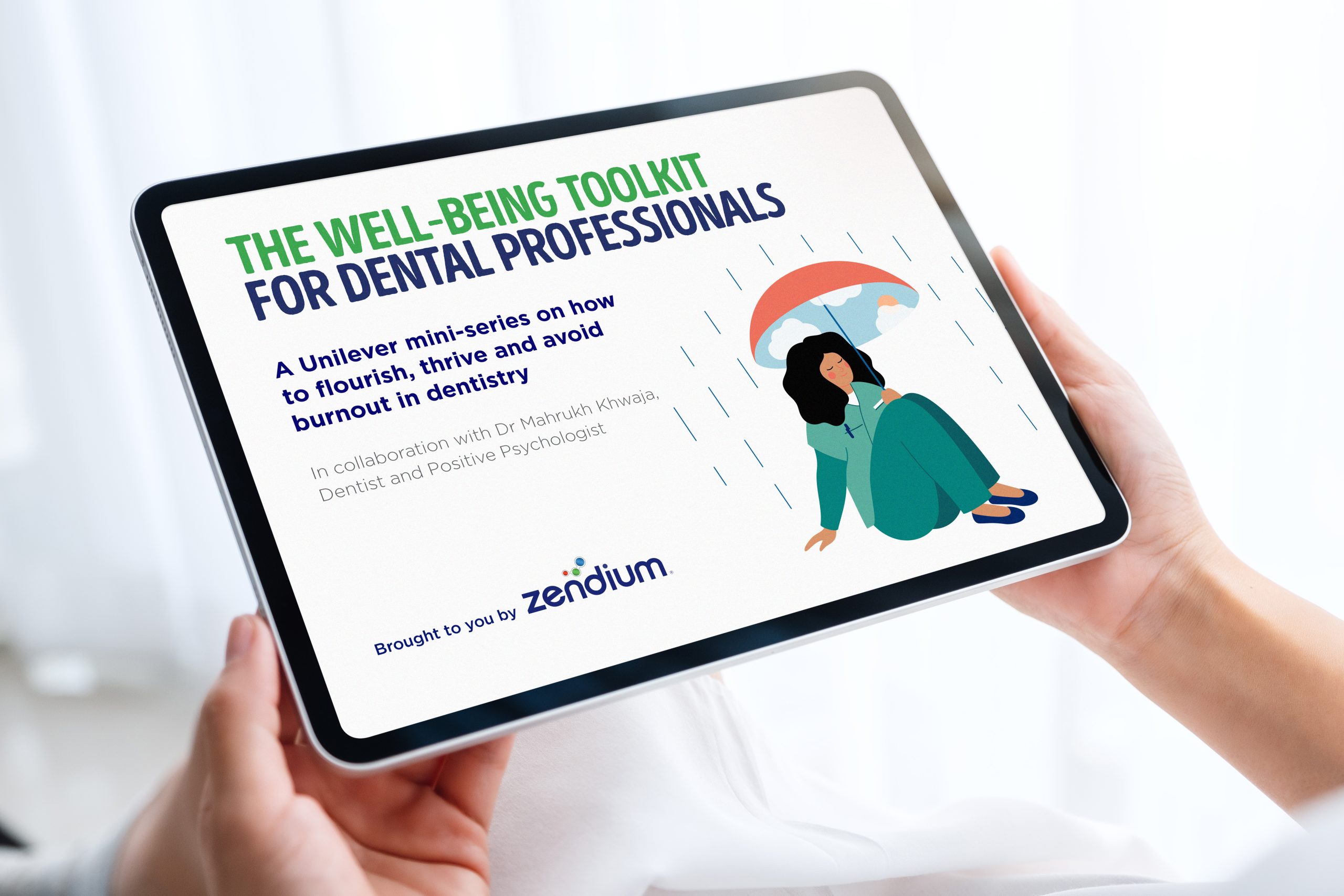
Mahrukh Khwaja details how preventative education is key to minimising burnout within dentistry.
The theme for World Mental Health Day this year was to ‘make mental health and well-being for all a global priority’.
As a dentist and positive psychologist on a mission to bring preventative education to the masses in dentistry, this theme is timely and highly relevant to the profession.
With the current elevated rates of anxiety, depression, burnout, suicidal thoughts and self-harm (Toon et al, 2019; Kay et al, 2008), preventative education has a significant place in helping to boost our protective factors and move towards positive well-being.
These psychological tools on their own won’t solve the mental health crisis in dentistry. But they will go a long way in prevention. It can help dental professionals develop the necessary skills of resilience and positive health.
As dental professionals, we spend so much time caring for our patients, it can be easy to neglect ourselves. It wasn’t until I experienced my own wellbeing challenges, that I really appreciated the importance of becoming the architect of my own mental health. I started using tools and activities that restored and revived me.
Positively tipping the mental health continuum to wellbeing
Mental health is a dynamic process and is always shifting. It can be thought of as a continuum. Imagine one end of this continuum representing low levels of mental health, such as burnout, and the other end representing high levels of mental health, for example thriving states.
Our starting point along the continuum is dependent on our genetic makeup. But it’s the positive and negative life experiences that shift us up and down this scale.
While we can’t directly control our genetics or all of life’s events, what we can influence is our mindset and habits. These can encourage a positive movement towards better mental well-being, despite setbacks.
These proactive habits – or protective factors – form the foundation of preventative interventions based on cognitive behavioural therapy, mindfulness and positive psychology that foster happier, thriving careers (Mache et al 2016; Astin 1997; Teasdale et al 2000; Goodman MJ, Schorling JB, 2012).
One key wellbeing intervention comes from the PERMA-H model (Seligman 2012; Lai et al, 2018). This focuses on six components of wellbeing to help people feel happier, energised at work, connected to others, have a sense of purpose and accomplish goals aligned to their values.
These approaches empower us with tools to manage negative thoughts. They also help to turture positive self-talk, adopt a compassionate and optimistic mindset, as well as develop a lifestyle that nourishes us.
Introducing Zendium’s Wellbeing Toolkit
This year I had the enormous good fortune to work with the oral care brand Zendium, from Unilever. I provided expert opinion on a very special wellbeing project. It is aimed at helping dental professionals integrate positive habits to boost and build their resilience: The Wellbeing Toolkit for Dental Professionals.
To make it accessible for all, it is a free wellbeing resource to download online, and distributed globally.
Drawing upon the PERMA-H model of wellbeing, this is an evidenced-based online toolkit. It encourages dental professionals to increase different wellbeing ingredients. This includes positive emotions and engagement at work and home.
It also helps to develop positive relationships, meaning, accomplishments that matter to them the most and positive health.
The wellbeing toolkit for dental professionals features a series of articles exploring each pillar of PERMA-H, with an introductory article on mental health in dentistry and burnout.
The fantastic aspect of this free resource is that each article breaks down the key takeaways from psychology and helps us integrate it through customised worksheets and activities.
It also features customised meditations for the profession. It explores a wide range of wellbeing topics – from increasing our self-awareness of our emotions to developing a kinder inner voice.
You can think of it as self-intervention. It is your guide to help you integrate the different ingredients of wellbeing, and increase positive feelings, positive thoughts and positive actions in the process.
From my own standpoint, I feel many dental organisations and bodies are still focusing solely on crisis point. They should be championing the many preventative positive strategies we can develop.
I’m excited to see that this resource goes beyond addressing how we can reduce negative emotions, to how we can live optimally and go beyond baseline.
The Wellbeing Toolkit for Dental Professionals can be used by individuals keen to boost positive health, as well as dental coaches, enthusiastic to provide evidenced based techniques to help support their coaches.

Acting before crisis point is critical to building resilience
Similarly to the overall objective of World Mental Health Day to ‘raise awareness of mental health issues around the world and to mobilise efforts in support of mental health’, the Wellbeing Toolkit for Dental Professionals aims to help dental professionals around the world to increase positive emotions and thriving states.
References
Astin, J. (1997). Stress-Reduction Through Mindfulness Meditation: Effects on Psychological Symptomatology, Sense of Control, and Spiritual Experiences. Master’s thesis, submitted for publication.
Goodman, M. J., & Schorling, J. B. (2012). A Mindfulness Course Decreases Burnout and Improves Wellbeing among Healthcare Providers. The International Journal of Psychiatry in Medicine, 43(2), 119–128
Kay, E.J., Lowe, J.C. (2008) A survey of stress levels, self-perceived health and health-related behaviours of UK dental practitioners in 2005. British Dental Journal, 204(11): E19-E19
Lai, M. K., Leung, C., Kwok, S. Y., Hui, A. N., Lo, H. H., Leung, J. T., & Tam, C. H. (2018). A multidimensional PERMA-H positive education model, general satisfaction of school life, and character strengths use in Hong Kong senior primary school students. Confirmatory factor analysis and path analysis using the APASO-II. Frontiers in psychology, 9, 1090.
Mache S, Bernburg M, Baresi L & Groneberg D.A (2016) Evaluation of self-care skills training and solution-focused counselling for health professionals in psychiatric medicine: a pilot study, International Journal of Psychiatry in Clinical Practice, 20:4, 239-244
Seligman, M. E. (2012). Flourish: A visionary new understanding of happiness and well-being. Atria Paperback.
Teasdale, J., Segal, Z. Y., Williams, M., Ridgeway, V., Soulsby, J., & Lau, M. (2000). Prevention of relapse/recurrence in major depression by Mindfulness-based cognitive therapy. Journal of Consulting and Clinical Psychology, 68, 615–623.
Toon, M., Collin, V., Whitehead, P. and Reynolds, L. 2019. An analysis of stress and burnout in UK general dental practitioners: sub dimensions and causes. British Dental Journal 226 , pp. 125-130.
Follow Dentistry.co.uk on Instagram to keep up with all the latest dental news and trends.


